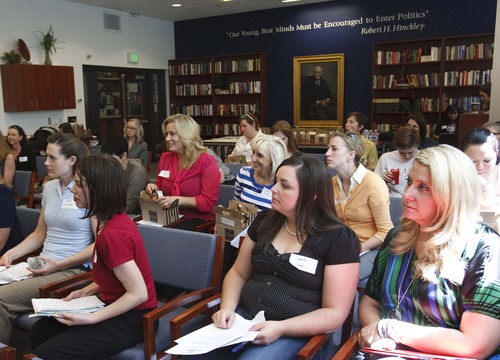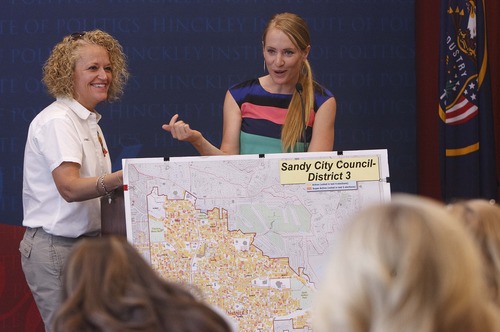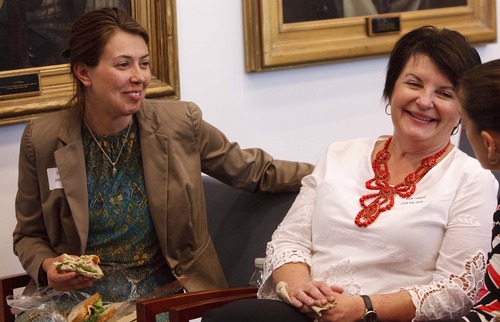This is an archived article that was published on sltrib.com in 2013, and information in the article may be outdated. It is provided only for personal research purposes and may not be reprinted.
Marianne Sorensen and Tara Dunn are competitors. Both are running for the two open seats on the St. George City Council.
But a little competition didn't stop them from climbing into the same car early Saturday and heading to Salt Lake City for a training seminar aimed at teaching women how to win at the political game.
"I invited her yesterday and I met her at four this morning when I picked her up at [a] service station," said Sorensen, a 50-something attorney and mother of three who is making her first bid for office. "We're competitors, sure. But I believe in abundance. I'd love to see us both there on election day."
Thirteen candidates are running for the council seats. Four of the 13 are women, and a primary is set for August, Dunn said.
"If no women make it through the primary, we'll be looking at an all-male City Council and mayor. I think that's unacceptable," said Dunn, a teacher, who has three kids and ran unsuccessfully for the council in 2011. "I think it's important that we get at least two of the four women through the primary."
Organizers of the Real Women Run would agree.
The group was formed in 2010 by individuals and organizations to encourage women to participate in politics, with an eye on increasing the number of women serving in elective offices across Utah.
Saturday's event brought together experts in campaign organization and planning, fundraising and execution to help give women a road map for getting on the ballot, including how to balance a campaign with work and family life. About three dozen women from Davis, Utah, Salt Lake, Summit and Washington counties attended.
"The tools we are getting are fabulous," said Dunn, "I'm totally soaking it up."
Nothing like this existed when Jill Remington Love ran for Salt Lake City Council 12 years ago.
"I had to just rely on a couple of friends who I thought were politically savvy," said Love, who is not seeking re-election but shared her expertise with campaign management. "It doesn't have to be that hard. The steps are easy if someone can take you through it."
Over the past two years, Real Women Run has hosted a half-dozen or so training sessions and seminars. In 2012, the focus was on statewide offices; this year, it's municipal elections, said YWCA Executive Director Anne Burkholder. The effort is purposely nonpartisan and designed to be collaborative.
"We are enormously excited about the interest that has been shown," said Burkholder. "We have a long way to go in Utah, but we are determined to make a difference,"
Women are generally under-represented in elective office at all levels of government, despite being 51 percent of the nation's population, according to data from the 2010 census. Of the 435 seats in the U.S. House, 78 are held by women, and they hold 20 of the 100 seats in the Senate.
In Utah, 12 women serve in the House and five in the Senate. Proportionately, women make up 16.3 percent of state lawmakers — a figure that leaves Utah ranked 47th nationally.
The numbers are disappointing given that women running for office win at the same rate as men, said Lindsay Zizumbo, program manager at the Hinckley Institute, a bipartisan think tank.
"The way I look at it, I don't think we are truly a representative democracy if half the population isn't represented ," said Utah House Rep. Rebecca Chavez-Houck, D-Salt Lake City, who attended the event. "People will say, 'You don't want it to be about quotas,' but it's not. It's about perspective. It's about how people look at public policy differently based on their experiences and their perspective. The community is richer for the solutions that we reach because of the different perspectives we bring."
Those perspectives can be driven by gender, ethnicity, sexual orientation and many other things that make communities distinctive and diverse, Chavez-Houck said.
"I don't think we are getting the best possible solutions for public policy issues and quandaries if we don't have women at the table," she said.
jdobner@sltrib
Twitter: @jenniferdobner







